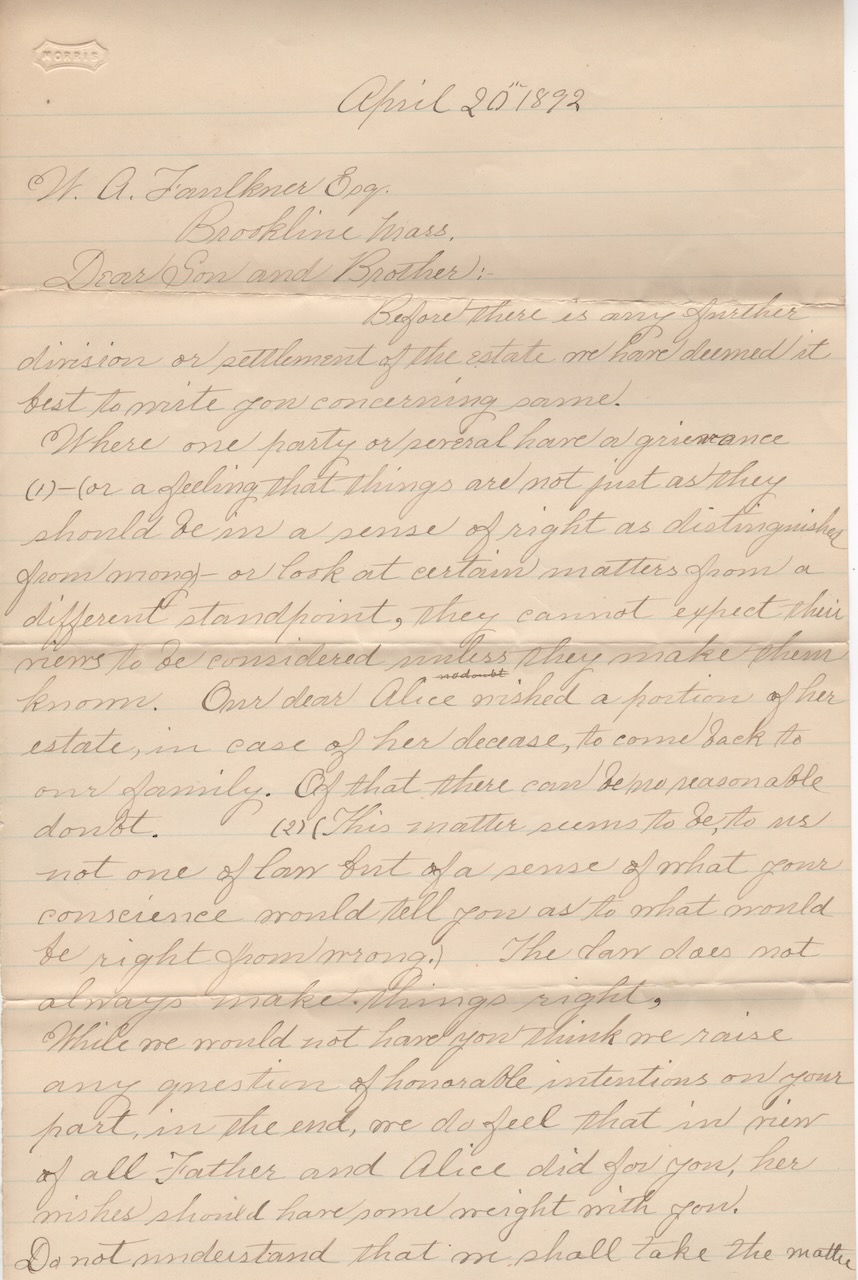Letter disputing unknown will (draft), April 20 1892
This letter is addressed to W. A. Faulkner, Esq in Brookline MA, and very politely disputes the will of "our dear Alice". It's not clear who Alice is. I don't know of any Alices in the Clement family. Alices in other parts of the tree didn't die at a time that would match this letter.
The letter was grouped with other Clement documents, so I'm tentatively considering it a Clement-related letter. Faulkner is addressed as "son and brother", which may point to his identity and Alice's. Perhaps he married a Clement and is the son-in-law and brother-in-law of the authors, or perhaps "brother" is simply a friendly term of address. More insight may yet come. The letter asks for $20,000 from Alice's estate, equivalent to around $650,000 in 2022.
The letter seems to be a draft, which would explain why the copy exists. There are some insertions and corrections, and the letter is unfortunately unsigned. Any strikethroughs below are in the original. The use of parentheses is also original, though somewhat puzzling.

April 20th 1892
W. A. Faulkner Esq.
Brookline MassDear Son and Brother:
Before there is any further division or settlement of the estate we have deemed it best to write you concerning same.
Where one party or several have a grievance (a) (or a feeling that things are not just as they should be in a sense of right as distinguished from wrong)-- or look at certain matters from a different standpoint, they cannot expect their views o be considered unless they make them known. Our dear Alice no doubt wished a portion of her estate, in case of her decease, to come back to our family. Of that there can be no reasonable doubt. (2) (This matter seems to be, to us not one of law but of a sense of what your conscience would tell you as to what would be right from wrong). The law does not always make things right
While we would not have you think we raise any question of honorable intentions on your part, in the end, we do feel that in view of all Father and Alice did for you, her wishes should have some weight with you.
Do not misunderstand that we shall take the matter into the courts, Father's life was too honorable and just with all men, and he lived in peace and harmony with everybody. No, we cannot drag his good name into the mire of a public suit; but we do appeal to your honor, for his sake and for dear Alice's sake, to set this matter right before it has gone beyond your power to do so. We feel in view of the large amount already received from the estate, that you should reliquish all claims to the undivided portions, including the Twenty Thousand Dollar (20,000) Fund. (3) This we recognize as a case where manhood must take the place of money rise superior to other considerations, and we inclune to the belief that you can only see it in this light). This statement is made to you in the kindest of spirit. No thought of suit or anything of the kind is intended. We feel that what we suggest is right and just.
In most of the states of our country, the law would as a matter of commno justice, give us no more than we ask. Were we placed as you are: in one of those states, New York for instance, where the whole estate, as we understand the laws of that state, would come back to our family, we should each one of us see that the dear one's wishes were carried out.
Having made our views and wishes known, we leave the matter in your hands, trusting we may hear from you soon.
Respectfully,
[ends]
The back includes some rougher related notes, maybe considered during drafting:
With new interests, which are quite likely to come to you & with them a change of feelings which come with new unreadable, what can we have reason to expect.
20000 Fund in place of this carry out sister Alice's wishes.
no thought (no thought we feel what we ask (we feel what we suggest)
Notes:
- An 1892 city directory for Boston lists a W. A. Faulkner as president of Traders National Bank, 50 Water St.